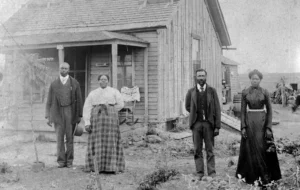
Andrew Jason Cohen, a philosophy professor at Georgia State University, recently wrote “Some Reflections on Reparations,” Discourse, September 22, 2023. Various commenters on Facebook have had some objections and I share some of them. But no one other than me stated my main objection.
I, along with co-author Charley Hooper, recently wrote about it in “The Surprising Beneficiaries of American Slavery,” American Institute of Economic Research, July 14, 2023, and I blogged about it here.
Here’s our basic argument:
Here’s the problem. The reparations being proposed will take money from people, the vast majority of whom gained nothing from slavery, and give it to people who benefited immensely from slavery.
Who suffered from slavery? The slaves themselves. They were brought from Africa against their will, and they were forced to work without receiving the full value of their labor.
Who gained nothing from slavery? Except for the rare person who inherited an estate that slavery enriched, every contemporary non-black American gained nothing from slavery.
Who gained from slavery? Americans of African descent.
The late economist Walter E. Williams said that slavery was the worst thing ever to happen to his ancestors, but the best thing ever to happen to him. Why? Because instead of growing up in Guinea-Bissau, Angola, Senegal, Mali, or the Democratic Republic of Congo, he enjoyed the opportunities, wealth, health, security, and freedom of the United States.
Cohen is aware that he must deal with this argument and he tries. He writes:
This is not to insist that the lives of descendants of slaves would be better if their ancestors had been left in Africa. But if they had come to the U.S. voluntarily and lived their lives freely, their descendants would be better off than they are. In this fairly simple sense, many African Americans are living less prosperous lives than they would have absent actions of the U.S. government.
It seems that in Cohen’s view, if they had not come to Africa as slaves, they would have come as free people. If that’s true, then his argument holds. It doesn’t necessarily justify reparations but it does justify the idea that they’re worse off.
But would they have come as free people? I don’t think so. Certainly some Africans would have come as free people but the vast majority would not have. So the the vast majority of descendants of U.S. slaves are better off now than if there hadn’t been slavery.
Interestingly, when I raised this idea on Facebook, Cohen said that he agrees with me that it’s unlikely that many Africans would have moved here voluntarily. Then he wrote that he’s not sure that it matters, adding:
The reason I am not sure it matters though is simply that I already admitted that African-Americans in the US may be better off than they would have been if born in Africa. I don’t think that’s the right comparison. In fact, all of the comparisons (my own included) are close to impossible to make. Add in the nonidentity problem, and it’s ….. really hard to be clear about.
That certainly left me unpersuaded. I still think it matters. It does get complicated, as some commenters on my original post pointed out. The main complication is that the descendants of slaves here are different from the would-be descendants if the people had stayed in Africa. But I don’t see how that complication undercuts Charley’s and my case.
One other issue is this. Various governments in the United States have done horrible things to many people that have violated their rights. For example, in World War II, the federal government imposed a draft, a form of short-term slavery, and arguably hundreds of thousands of draftees died or were seriously wounded because of the draft. (It might be only a hundred thousand because one can argue that the majority of draftees would have volunteered.) Should the government give them reparations? It’s not hard to see that the sum total of reparations for various government measures could exceed a few years of GDP. And they would be paid by people who had nothing to do with it. Check Cohen’s article for his distinction between the government, which he thinks should pay, and various innocent people who would be required to pay. He thinks he can get around this issue by saying that taxes are not punishment and so innocent people aren’t being punished. That’s a stretch.
One other objection. Why stop at having the U.S. government do reparations? Why not seek reparations from governments in Africa that failed to jail African slave catchers who sold the slaves?
Also, think of all the people that the U.S. government is forcibly preventing from coming here and think about their losses. Should they get reparations?
In a comment on my blog post, my co-author Charley Hooper pointed out that if anyone is owed reparations, it’s American Indians. He also wrote:
The historian J. Rufus Fears said that you can never satisfactorily resolve past grievances. You can’t aim for justice because everyone has a different idea of what that means. You can only stop current injustices, forgive, and move on.


